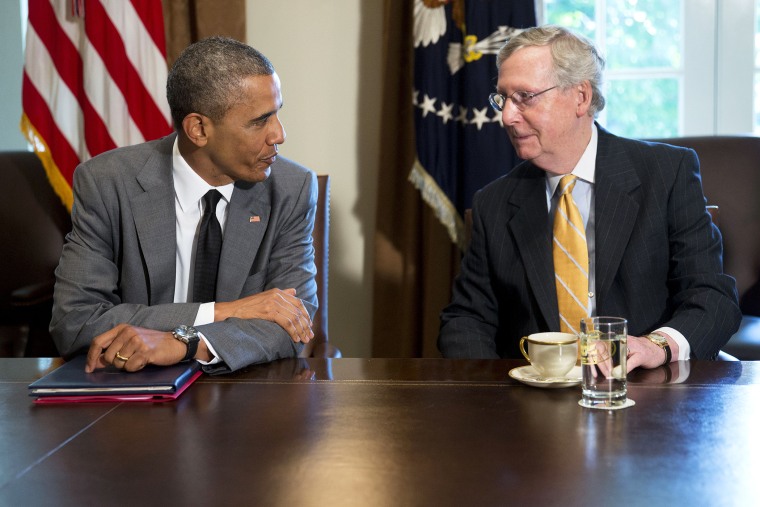The Wall Street Journal reported the other day that the Republican-led Congress plans to quickly take up "legislation approving construction of the Keystone XL pipeline," which President Obama is likely to reject.
"Such a move could antagonize Republicans," the newspaper noted.
It's always fascinating to see the ways in which political observers accept certain premises. In this case, Republicans aren't "antagonizing" the president by pushing a dubious policy they know he doesn't like; rather, it's the White House antagonizing Republicans by rejecting their bad idea.
And looking ahead, we can apparently expect quite a few antagonizing moves from GOP lawmakers.
Soon-to-be Senate Majority Leader Mitch McConnell laid out Sunday his conservative priority agenda for 2015, and warned that President Obama might not like what's coming down the pike. "We'll be voting on things I know he's not going to like," McConnell said during an appearance on CNN's "State of the Union." ... McConnell said the new Republican-controlled Congress, which convenes Tuesday, will kick off the year with more attempts to repeal what he called Obama's "terrible piece of legislation," the Affordable Care Act.
To borrow a phrase, such a move could antagonize the White House.
Regardless, all of this highlights the GOP's perspective as the new Congress gets underway. The aforementioned WSJ piece said Republican leaders "want to work with Mr. Obama but are skeptical that he will compromise." (No, seriously. Despite the last six years, that's what they're telling reporters.)
One of incoming Senate Majority Leader Mitch McConnell's (R-Ky.) top aides added, by way of a justification for confrontation, "We just had an election on [the president's] policies."
That's actually an interesting quote -- the parties don't just disagree on policy; they disagree on the direction of the prevailing political winds.
For Republicans, voters just forcefully rejected Obama, so GOP lawmakers have been given a mandate to fight the White House tooth and nail. For Democrats, voters are disgusted by Washington dysfunction, not progressive governance. Republicans won just over half of public support in a cycle when voter turnout dropped to its lowest level in more than 70 years, which is hardly the basis for a dramatic shift to the far-right.
There's reason to believe the Democratic interpretation is correct. Note that President Obama's approval rating has shown a sharp improvement in recent weeks as he announced several policy breakthroughs. "We just had an election on [the president's] policies," but Obama ignored the results and got a lot done -- and his support from the public jumped more than anyone expected. If the Republicans' thesis were correct, we would see the opposite result.
(According to Gallup, Obama's approval rating climbed seven points over the course of his sixth year in office. Since 1945, only two presidents have fared this well in their sixth year: Clinton and Obama.)
The bottom line is this: Republicans enter 2015 thinking, "We won, so we can do as we please." But the cues aren't as obvious as they'd like to believe -- Republicans never presented a policy agenda to voters before the election, so they can't very well claim a mandate now, and the more Obama advances his agenda, the more popular he becomes, GOP predictions be damned.
Republicans seem to assume they can pick fights with the White House, confident the public will side with the GOP majority voters just elected. The more they stick to that assumption, the more disappointed the party's leaders are likely to be.
